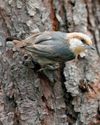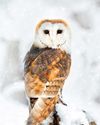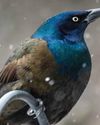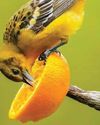
Whether you are lucky enough to see them in your backyard or plan to head to a local spot for prime viewing, lightning bugs are synonymous with summer. Let's illuminate some little-known truths about these fascinating, glowing creatures.
What's the Real Name?
More than 2,000 species of lightning bugs and fireflies exist worldwide, including 170 in North America. According to Adele Wellman, Allegany region environmental educator for New York State Parks, calling them either fireflies or lightning bugs is fine. "There is no difference between them; they are the same insects," she says.
Though both names are correct, these flashers are technically neither bugs nor flies. Instead, they are beetles. Next time you've got one in your hands, look closely for hardened wing cases, the elytra. This is a key beetle characteristic.
Growing Up
"Fireflies go through complete metamorphosis," Adele says. "They lay eggs in moist areas, and these hatch in about two weeks. The larvae grow for months, pupate underground or beneath tree bark, and then transform into adults."
Adulthood is short-lived for these beetles. Most adult fireflies survive for just days or weeks.
Denne historien er fra August/September 2022-utgaven av Birds & Blooms.
Start din 7-dagers gratis prøveperiode på Magzter GOLD for å få tilgang til tusenvis av utvalgte premiumhistorier og 9000+ magasiner og aviser.
Allerede abonnent ? Logg på
Denne historien er fra August/September 2022-utgaven av Birds & Blooms.
Start din 7-dagers gratis prøveperiode på Magzter GOLD for å få tilgang til tusenvis av utvalgte premiumhistorier og 9000+ magasiner og aviser.
Allerede abonnent? Logg på

Basics of Hydroponics
Use these top tips and plant picks to have a successful soil-free garden

Rooted in Resilience
These hardy perennials will thrive in most zones

Social and Supportive
Brown-headed nuthatches take a helpful approach to raising their young

All About Owl Pellets
And why you should give a hoot about them

Ask the Experts
Advice from our pros about houseplants, bird feeding and more

BRING THE OUTDOORS IN
Making a terrarium is about as close as you can get to a Zen DIY project. Once you have gathered the proper materials and squared away your plant selections, it's as simple as layering it all together and watching your mini ecosystem thrive. Here, I'll walk you through my foolproof process and cover all the required elements for good filtration, healthy soil, strong root growth and resistance against fungus and disease.

GROW THIS. NOT THAT
Six easy-to-grow houseplants—and six that may not be the right choice for you

Winter MAGIC
Forecasts may be frigid, but grab your binoculars because birding opportunities are still incredible

Sense or Nonsense? - Why some birds can taste and smell - but others can't
Does a porcelain berry taste like a blueberry to a gray catbird? Does a block of lard smell like frying bacon to a northern flicker? The short answer is no. While some avian species do have a well-adapted sense of taste or smell, they can't distinguish between flavors and odors the way humans can. They're not picking up every ingredient in the suet you put out, says José Ramírez-Garofalo, an ornithology researcher at Rutgers University in New Jersey and the director of Freshkills Biological Station in Staten Island, New York.

Maple Mania - Amazing facts about this fall foliage mainstay
Amazing facts about this fall foliage mainstay